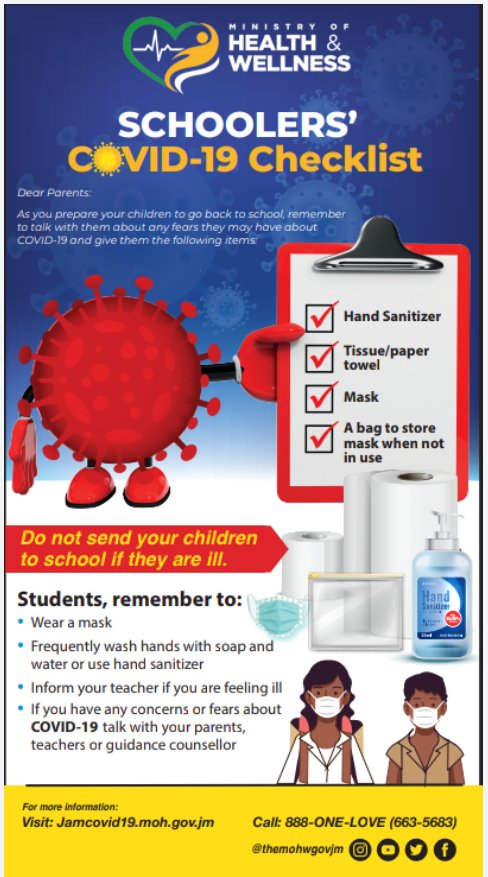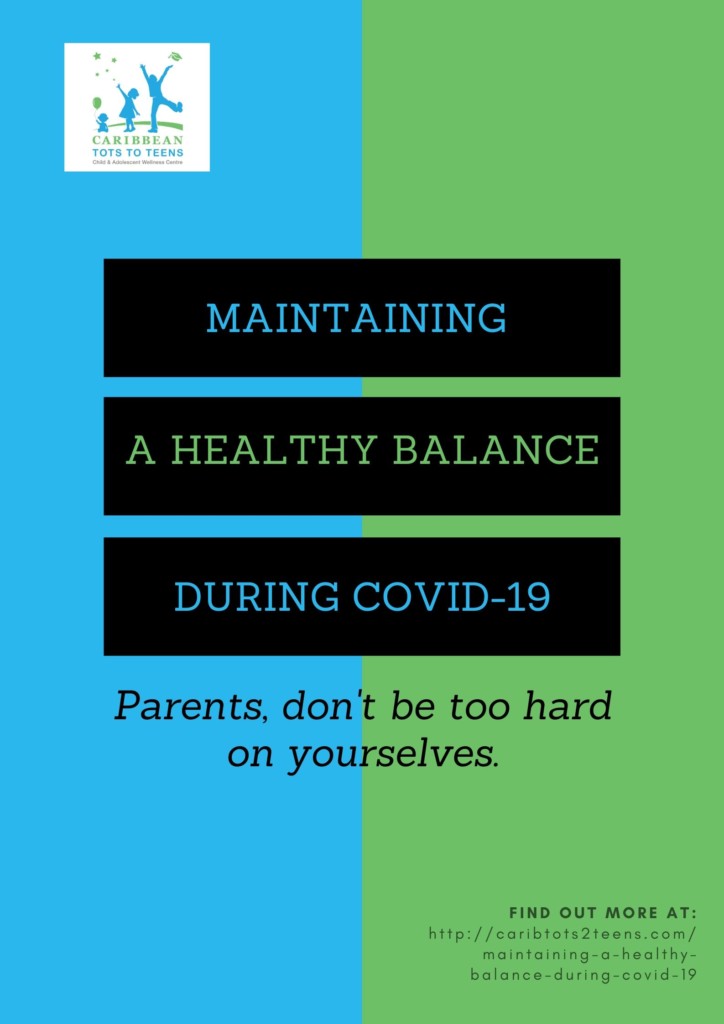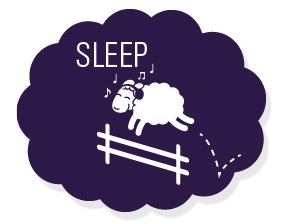Schoolers’ COVID-19 Checklist

Here is a list of precautions geared towards protecting children going back to school in the midst of the COVID-19.
#backtoschool #covid19 #schoolers
Learn MoreMaintaining a Healthy Balance During COVID-19

Due to the outbreak of COVID-19 parents, guardians and children are now dealing with major disruptions in their daily lives. Moving work life and school life into the home is not an easy task and can result in stressful and/or anxious feelings. In order to manage stress and anxiety remember to:
- Be aware of disruptions in your sleep pattern and eating habit, change in mood and concentration
- Take care of yourself; take breaks periodically, eat healthy and exercise
- Create supportive network with coworkers, supervisors, and family members
- Schedule activities with the family; include family relaxation time
Create a suitable environment at home that is conducive for work by:
- Ensuring a comfortable workspace within your home
- Being comfortable with yourself and wearing what makes you feel relax
- Setting schedules that are convenient for the family; taking into consideration early mornings when everyone is still asleep, when children are having lunch, or during relaxation period for children.
- Maintaining regular work schedule; avoid burnout by working extended hours at home
- Daily reflecting and reviewing what worked and what did not work, and implement the necessary adjustments
- Setting realistic expectations; you may not be able to accomplish the same goals at home as you would being in a work environment, while managing children at home and working from home
- Realizing that things will go wrong, and accidents are prone to happen; children will accidentally interrupt a meeting, the sound of the dogs barking while talking to a client, baby will get anxious and irritable. Do not be too hard on yourself
Prepared by: Camille Campbell
Adapted from: The Bellarmie University: https://www.bellarmine.edu/news/archives/2020/03/18/covid-19-expert-keim-working-from-home/
Learn MoreCoping with the Stress of COVID-19

Young children often react to their environment. As a result, they might respond to the pandemic based on the response of parents and guardians. It is very likely that if parents and guardians react to COVID-19 with a calm and confident approach (even though it might be difficult to do so), children will also adopt to this approach. In addition, parents and guardians need to be better able to communicate and interact effectively with children during this period and about COVID-19.
Here are some behavioural changes in children that parents and guardians should look out for:
- Persistent crying and irritability in toddlers
- Persistent sadness
- Disrupted eating and sleep patterns
- Developed difficulty concentrating
- Avoiding online classes and schoolwork
How can YOU offer support?
- Take the time to talk to children in a language that they can understand, based on their age and level of development
- Respond to questions honestly and factually
- Provide reassurance and validate feelings
- Be mindful of their exposure to information – limit what they hear and see from multiple sources
- Develop and implement a routine that is as close as possible to their school routine; include learning activities and relaxation activities
Lastly…

Help them maintain connection with their peers and other family members.
A few minutes of video-chat with others can be really helpful (monitor the chat, if necessary).
Prepared by: Camille Campbell
Adapted from an article by the CDC: https://www.cdc.gov/coronavirus/2019-ncov/daily-life-coping/managing-stress-anxiety.html
Learn MorePromoting Healthy Eating Habits

Many families are looking for ideas on how they can improve their family’s eating habits. But making changes that last takes time. Healthier habits are easier to make when changes are made together as a family. To kick-off this discussion, we’re giving you parents out there tips on creating healthier meal patterns. Pick one or two from the list below to help your family improve their eating habits.
Creating healthy meal patterns
- Define specific roles for the parents and child at meal times. The parent will choose what, when, and where foods are offered. The child will decide whether and how much they will eat.
- Provide meals and snacks on a regular schedule. Children should eat 3 meals and 2 to 3 snacks each day. Only offer water between meal and snack times.
- Serve snacks that are mini meals. Use foods from 2 or 3 food groups to create balanced snacks.
- Eat together as a family. Children will learn to make healthy choices by watching their parents. Encourage everyone to practice stopping when they are full.
- It can be easy to overeat if you are focused on something else. Avoid distractions while eating, especially screen time.
- Use nonfood items as rewards. Try activity related rewards, like playing a board-game with the family, one-on-one football with dad in the yard or dress-up with mom. Items like a book, ball, bracelet or stickers are healthy rewards, too.
- Some children eat because they are bored or dealing with emotions, like being sad or upset. Talk with your child about activities they can do when they are bored and how to cope with their feelings.
- Include your whole family in food preparation and cooking.
Prepared by: Christeena Johnson, RD
Adapted from: Seattle Children’s Hospital (2017). Healthy eating habits. Retrieved from:
https://www.seattlechildrens.org/globalassets/documents/for-patients-and-families/ce/CE220-healthy-eating-habits.pdf
Managing Grief – by Janelle Reid
Grief is a natural response to loss, yet many of us are at a loss when someone around us is grieving. People of ANY AGE from toddler to ‘great grand’, experience grief. This 2 minute video is a quick guide to help to frame grief in a way that can allow you to process what is happening, and to take action if needed.
Grief can be a heavy burden, impacting every aspect of growth and development, every aspect of life. Don’t try to bear it alone. Find support, get help, you wont “get over” it , you can get stronger.
Sleep Well, Be Well | Marie Reynolds

“Sleep is the underpinning of our entire well-being. For centuries people thought that sleep was a time of inactivity that the brain was resting. But all the new science proves that the opposite is true — that during sleep the brain is in a state of intense activity, which is necessary for us to fully recharge and be productive, creative and truly connect with ourselves and others during the day.” ~ Arianna Huffington, formerly of The Huffington Post and author of The Sleep Revolution: Transforming Your Life, One Night at a Time
Every year on the third Friday of March we honor the active, important process of Sleep on World Sleep Day. In 2018 the theme was Join the Sleep World, Preserve Your Rhythms to Enjoy Life, focused on the importance of circadian rhythms in healthy sleep.
What are circadian rhythms?
The word circadian originates with the word cycle. No doubt you’re familiar with the term menstrual cycle. Well our bodies have other cycles as well: rhythms in body temperature, hormone levels and how alert we are; these are circadian rhythms. They are produced by biological clocks within our bodies. Environmental factors such as sunlight, artificial light and the blue light from TV and electronic device screens can also affect them.
Following our bodies natural rhythms is important for our physical, mental and sleep health. Unfortunately, our modern, heavily scheduled, technologically crammed lifestyle is anything but natural. Even our children may go to bed at varying times depending on the time we are able to get them home, and how much homework or other activities are on their plates. The morning commute, and an early start to the school day mean having to get them up at the crack of dawn, often with a fight because the schedule has disrupted their circadian rhythm.
Creating a Sleep Schedule
A regular schedule, including having a set bedtime and wake-up time is important for overall health and sound sleep—one of the three pillars of good health, along with a balanced diet and healthy exercise. Sleep, like exercise and nutrition, is essential for good metabolic regulation in children. Lack of sleep or poor quality sleep is known to have a significant negative impact on health in the long and short term. There is evidence of a link between length of sleep and childhood obesity— most apparent in girls— due to the effect of day-to-day variability of sleep-wake timing on weight regulation. The sleep chart below outlines the average length of sleep needed at various ages and stages of life (Courtesy of http://www.sleepaidresource.com/sleep-chart.html ).
SLEEP CHART BY AGE |
||
| Age |
Total Sleep Needed |
Additional Notes |
| 1-4 Weeks | 15-16 Hours | Newborns are developing their internal biological clocks |
| 1-4 Months | 14-15 Hours | Regular sleeping patterns begin and longer night sleeping |
| 4-12 Months | 14-15 Hours | Important to establish regular sleeping patterns at this time |
| 1-3 Years | 12-14 Hours | Naps remain important to sleep health |
| 3-6 Years | 10-12 Hours | Naps will become shorter |
| 7-12 Years | 10-11 Hours | Bedtime gets later |
| 12-18 Years | 8-10 Hours | Teens may need more sleep |
| Adults | 7-8 Hours | Times will greatly vary |
Quality of sleep is just as crucial as length of sleep. Believe it or not, some of the most important work that your child’s brain can do for their intellectual, emotional and physical well-being takes place while your child is asleep! Breathing regularly during sleep is critical to maintaining well-being and health. One of the most common issues affecting children’s sleep is poor breathing due to issues such as enlarged adenoids, sleep apnea (the interruption of the breathing function during sleep), sinusitis, and even nasal allergies. If you think your child may be affected, consult your doctor for referral to an appropriate specialist.
Whatever the cause, poor quality sleep may have a negative effect on your child’s attention span, memory recall, and learning. Behaviors and emotions are also affected. For example, some children suffering from poor quality sleep show symptoms that mimic ADHD. Regular, quality and restorative sleep may just be the prescription for your child’s irritability, hyperactivity, moodiness, or anxiety.
The bottom line is that healthy sleep will improve children’s overall wellness and development. The World Sleep Society has created the 10 Commandments of Sleep Hygiene for Children [Ages birth to 12 years] (See below) The number one tip for good sleep health is establishing a nightly bedtime routine that could include:
BEDTIME ROUTINE
- Have a light snack
- Take a bath or have a warm shower
- Put on pajamas
- Brush teeth
- Read a bedtime story
- Say prayers
- Make sure the room is quiet and at a comfortable temperature
- Tuck child in bed
- Say goodnight and leave
Here are all ten of the 10 Commandments of Sleep Hygiene for Children:
10 Commandments of Sleep Hygiene for Children
- Go to bed at the same time every night, preferably before 9:00PM.
- Have an age-appropriate nap schedule.
- Establish a consistent bedtime routine.
- Make your child’s bedroom sleep conducive – cool, dark, and quiet.
- Encourage your child to fall asleep independently.
- Avoid bright light at bedtime and during the night, and increase light exposure in the morning.
- Avoid heavy meals and vigorous exercise close to bedtime.
- Keep all electronics, including televisions, computers, and cell phones, out of the bedroom and limit the use of electronics before bedtime.
- Avoid caffeine, including many sodas, coffee, and teas (as well as iced tea).
- Keep a regular daily schedule, including consistent mealtimes.
Setting schedules for children can be difficult. Please let us know how you manage a sleep schedule in your home, in the comments below.
References
Written by Marie Reynolds a Clinical Social Worker – Paediatric Psychotherapist who offers therapy for infants and young children with their parent(s).
Learn MoreBeing Your Child’s Greatest Influence l Kellie-Anne Brown-Campbell

Parental Influence
We wanted to be “big” so much when we were growing up. We wanted to be an adult, to be able to go and do whatever we wanted to do. As girls, we dressed up in mummy’s high heels, threw scarf over our heads and pretended it was hair flowing down to our buttocks. We watched in awe as our fathers drove the car or as our mothers cooked meals. Who did we want to be like? If you think hard enough, our parents would be the answer. However, at some point, things changed. We started to look outside our homes; everyone and everything became more attractive and started to influence us. How we dressed, how we felt about ourselves, who we chose as friends, etc. Thus, as parents, how do we maintain that level of influence with our children?
Influence Through Socialization
In Sociology, the socialization of human beings is described as social agents being carried out with the family spoken to as the most influential agent of socialization during childhood. Outside of the family the other most influential social agents include school, peers and mass media. Conversely, today, social media is probably more influential than traditional media such as television and radio. Our children need the family, led by parents even more than ever before. There is significant competition happening in the world today, as so many forces (many of them negative) are now competing for control over our children’s lives. Therefore, as parents, it is critical that we find innovative and consistent ways to maintain positive influence over our children’s lives.
Influence Through Education
Being actively involved in our child’s education and school life is one of the most important ways to maintain a positive and dominant influence on them. Research has shown that when parents are involved in their child’s education, improvement in grades and test scores are seen; homework completion increases; and attitudes and behaviours towards academics and school improve. In addition, children’s active involvement in co-curricular and extra-curricular activities increases with parents involvement. Likewise, with parents active involvement in their child’s education, comes personal benefits; this has been my experience as a child, and now a parent of a young child. Conversely, teachers and administrators look out for the children of involved parents; somehow, it makes them happy to know that parents are a part of the team, and as such, they approach the education and nurturing of your child as such.
Lead By Example
In order to maintain influence over our children’s lives, it is also critical to lead by example. It’s becoming a very disappointing trend lately for adults to chastise our nation’s children about very negative and crass behavior. However, I beg to ask the question- “where did they learn these behaviours?” Evidently, the behaviours we see in our children is only a small representation of what exists in the larger society. The age old adage still applies today- “Children learn what they live, children live what they learn”. I would like to remind us of some of the words of the timeless poem by Dorothy Law Nolte, Ph.D.
Children Learn What They Live
If children live with criticism, they learn to condemn.
If children live with hostility, they learn to fight.
If children live with fear, they learn to be apprehensive.
If children live with pity, they learn to feel sorry for themselves.
If children live with ridicule, they learn to feel shy.
If children live with jealousy, they learn to feel envy.
If children live with shame, they learn to feel guilty.
If children live with encouragement, they learn confidence.
If children live with tolerance, they learn patience.
If children live with praise, they learn appreciation.
If children live with acceptance, they learn to love.
If children live with approval, they learn to like themselves.
If children live with recognition, they learn it is good to have a goal.
If children live with sharing, they learn generosity.
If children live with honesty, they learn truthfulness.
If children live with fairness, they learn justice.
If children live with kindness and consideration, they learn respect.
If children live with security, they learn to have faith in themselves and in those about them.
If children live with friendliness, they learn the world is a nice place in which to live.
Get Involved! Stay Involved!
Thus, in the spirit of the theme of Parents’ Month this November 2017, I encourage us as parents to remember that we have the greatest and hardest job of all- we have been entrusted with lives that we must see as our responsibility to mold and enhance in the best ways possible. Let us remember to encourage our children onto good works and prepare them for greatness, while teaching them about reality and the world. Let us set good examples for them to follow so that they can help to make this world a better place. GET INVOLVED! STAY INVOLVED IN THEIR LIVES! Also, remember that they are children- no matter how tenacious and precocious they may be. Remember that children are not in charge of themselves and we have to lead the charge to direct and guide them into being the best human beings they can possibly be!
Written by Kellie-Anne Brown-Campbell, Associate School Psychologist
Learn More
Less is More….But Not With Sleep| Janelle Reid

Sleep is an active function which our body requires for optimal performance. The body has a sleep cycle; while we sleep several tasks are operating simultaneously such as processing, restoration and strengthening. I bet you thought you were dead asleep! Poor sleep hygiene can affect our state of well-being resulting in an increased risk for physical and mental illnesses such as heart disease, stroke, cancer, reduced immune system, weight gain, anxiety and depression.
Time to Sleep
Moreover, children, adolescents and adults require varying hours of sleep for optimal body function. According to National Sleep Foundation, it is recommended that newborns to the toddler years (0-2 years old) should have 11-17 hours of sleep. Preschoolers to school aged children (3-11 years old) require 9- 13 hours of sleep. Teenagers to young adults (12-25 years old) require 7-10 hours of sleep and adults (26 and older) require 7-to 9 hours of sleep. Getting the recommended hours of sleep is important! Are you ready for a good night’s sleep?
The Sleep Cycle
There are two main types of sleep, rapid eye movement (REM) sleep and non-rapid-eye-movement (NREM) sleep. This cycle takes place throughout the night beginning with NREM sleep and transitioning into REM sleep. NREM and REM sleep alternate throughout a night’s rest.
During REM sleep the body becomes energized and dreaming takes place. Rapid Eye Movement sleep occurs approximately 90 minutes after falling asleep. Have you ever felt like you are falling or experienced sudden twitches while you are asleep? If you said yes, you are experiencing NREM sleep. This stage of sleep has three cycles and the human body moves from wakefulness sleep (stage one) to less responsive sleep (stage three).
Sleep and Mental Health for Children and Adults
On the other hand, a correlation between lack of sleep and mental health has been identified through several research studies. In fact, some studies concluded sleep deprivation in children and adolescents later resulted in some mental health disorders in adults; one example is depression. On the contrary, patients diagnosed with some mental health disorders such as anxiety disorder, post traumatic stress disorder (PTSD), obsessive compulsive disorder (OCD) and phobias may experience sleep deprivation.
In addition, substance use including prescribed drugs, legal and illegal substances can disrupt the sleep cycle which may result in sleep disturbance. It is best to avoid substances and get a good night’s rest.
Sleep Hygiene
Sleep hygiene relates to the routines and behaviours one can develop throughout the course of the day and before bedtime. This might include a regular sleep schedule, avoiding naps, getting out of bed within 5-10 minutes of being awake, curb your habit of reading or watching television in the bed, reduce caffeine intake, avoid substance use, ensure your bedroom is quiet and comfortable, and have some quiet time before heading to bed. Did you know exposure to natural sunlight helps to regulate your normal sleep-wake pattern? Get out and get some sunlight!
Let’s Count Sheep
Are you ready to sleep? Remember lack of sleep can trigger emotional distress and may result in mental health disorders. Therefore, ensure you develop good sleep hygiene, avoid substances, and get the required hours of sleep for optimal functioning.
Written by, Janelle Reid, Mental Health Counsellor & EMDR Counsellor
Learn MoreBack To School: 4 Tips to Get You Ready | Dr. Shauna Miller
It’s that time of year when we consult school lists and rush around trying to get everything into place for the coming year. While in the process of organizing all the material necessary for a successful year, it may be helpful to build habits and routines that can ensure long-lasting success. The following steps may seem simple but have proven to help children not only do well in school but have better social and emotional lives.

Imagine retrieved from https://thoughtcatalog.com/cehudspeth/2013/03/what-your-bedtime-says-about-you/
ONE: Establish good sleep routines
Good sleep is key. We all know how difficult it can be to function with limited sleep and this is no less true for children. In fact good quality sleep has been linked to better mental and physical health. We need to help our children benefit from adequate sleep even if they are afraid of missing out! Of course during the holidays many children have enjoyed long days and freedom over when to get to bed. Now that the school year looms, it may be useful to phase in earlier bedtimes. Each week set a bedtime that gets closer to the one used during the year to help youngsters to adjust to a schedule. Limit the use of electronics before bedtime and prohibit them from use in the bedroom as they can significantly delay the onset of sleep. Instead, establish relaxing routines right before bed with quieter activities such as reading, listening to quiet music, drawing or bath time.
TWO: Plan for healthy eating
Nutrition has been shown to be just as important as good sleep for academic and socioemotional success. Now is the time to think through what the meals for the school year might look like, especially in the mornings. Are mornings busy? Think about having pre-prepared options such as pre-made porridges, boiled eggs, sandwich fillings that can be quickly made ready in the morning. Fresh fruits should be accessible as quick snacks. Children often model the eating habits of their parents so a good way to develop an appetite for fruits and vegetables in your children, is to eat them consistently. It is very important for children to go to school with a good breakfast as they need those nutrients to properly engage in learning.
THREE: Develop a consistent work schedule
Homework time can sometimes range from a minor hassle to a full-scale war. If children have a set expected time that they have to work every day, it can ease some of the friction of homework time. Even now, during the summer it may be best to have a daily time of active learning to ease the transition back to school. Have a set time that children must engage in a learning task whether they have an assignment or not. Consistency is the key to success with children. Ideally homework time should be after a short break from school and before any T.V. or tablet time. Ensure that the assigned work or activity is completed before children are allowed to play. If you find that your child seems daunted by homework, try breaking tasks into chunks with very quick breaks after each e.g. do 5 problems or 2 questions or work for 15 minutes.
FOUR: Connect
Listening to our children is one of the most valuable steps to maintaining a positive, healthy relationship. As children get older it can seem harder to get them to talk. Spend time with them doing things that they enjoy and patiently wait for them to share their thoughts. As they speak freely about their lives, it is important to remain as neutral and positive as possible. If you begin to lecture or ask too many questions, children become reluctant to share. This does not mean you should not address concerns! But make careful judgments about what you need to probe and how you can engage in a productive discussion. We need to be able to hear what is going on in our children’s lives as they re-enter school and face their own challenges, successes and failures, and difficult decisions. We need to be able to understand their frustrations and hopes and detect early warning signs of problems. Making the time to connect with our children will pay off for years to come.
Written by Dr. Shauna Miller, School Psychologist
Learn More









